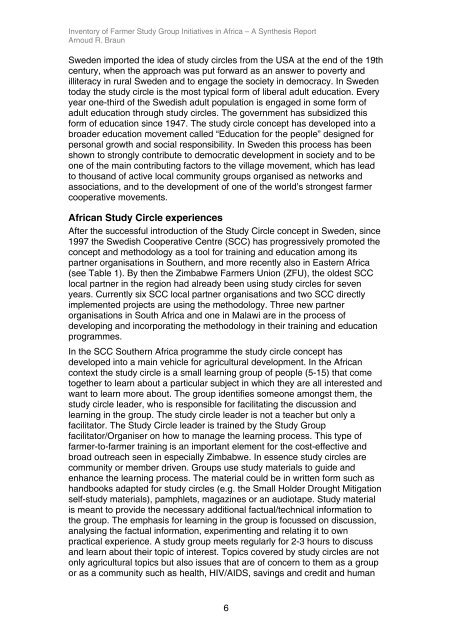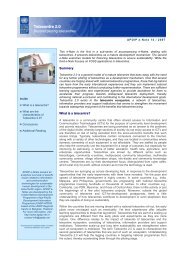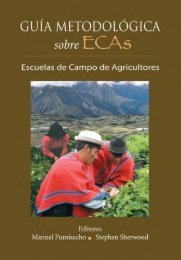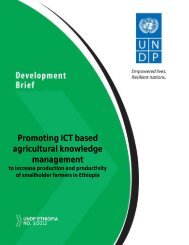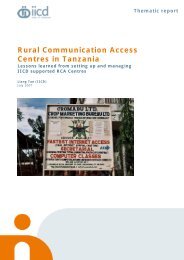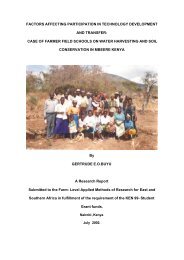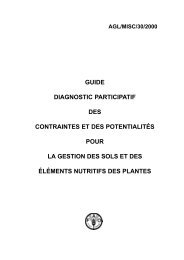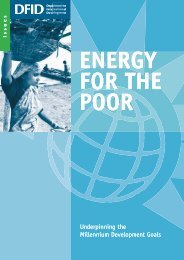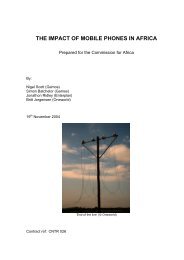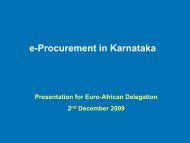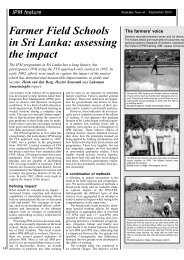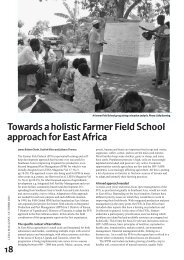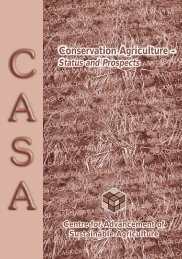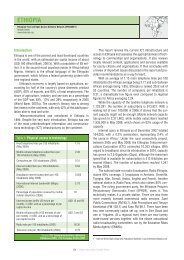inventory of farmer study group initiatives in africa - Share4Dev.info
inventory of farmer study group initiatives in africa - Share4Dev.info
inventory of farmer study group initiatives in africa - Share4Dev.info
You also want an ePaper? Increase the reach of your titles
YUMPU automatically turns print PDFs into web optimized ePapers that Google loves.
Inventory <strong>of</strong> Farmer Study Group Initiatives <strong>in</strong> Africa – A Synthesis Report<br />
Arnoud R. Braun<br />
Sweden imported the idea <strong>of</strong> <strong>study</strong> circles from the USA at the end <strong>of</strong> the 19th<br />
century, when the approach was put forward as an answer to poverty and<br />
illiteracy <strong>in</strong> rural Sweden and to engage the society <strong>in</strong> democracy. In Sweden<br />
today the <strong>study</strong> circle is the most typical form <strong>of</strong> liberal adult education. Every<br />
year one-third <strong>of</strong> the Swedish adult population is engaged <strong>in</strong> some form <strong>of</strong><br />
adult education through <strong>study</strong> circles. The government has subsidized this<br />
form <strong>of</strong> education s<strong>in</strong>ce 1947. The <strong>study</strong> circle concept has developed <strong>in</strong>to a<br />
broader education movement called “Education for the people” designed for<br />
personal growth and social responsibility. In Sweden this process has been<br />
shown to strongly contribute to democratic development <strong>in</strong> society and to be<br />
one <strong>of</strong> the ma<strong>in</strong> contribut<strong>in</strong>g factors to the village movement, which has lead<br />
to thousand <strong>of</strong> active local community <strong>group</strong>s organised as networks and<br />
associations, and to the development <strong>of</strong> one <strong>of</strong> the world’s strongest <strong>farmer</strong><br />
cooperative movements.<br />
African Study Circle experiences<br />
After the successful <strong>in</strong>troduction <strong>of</strong> the Study Circle concept <strong>in</strong> Sweden, s<strong>in</strong>ce<br />
1997 the Swedish Cooperative Centre (SCC) has progressively promoted the<br />
concept and methodology as a tool for tra<strong>in</strong><strong>in</strong>g and education among its<br />
partner organisations <strong>in</strong> Southern, and more recently also <strong>in</strong> Eastern Africa<br />
(see Table 1). By then the Zimbabwe Farmers Union (ZFU), the oldest SCC<br />
local partner <strong>in</strong> the region had already been us<strong>in</strong>g <strong>study</strong> circles for seven<br />
years. Currently six SCC local partner organisations and two SCC directly<br />
implemented projects are us<strong>in</strong>g the methodology. Three new partner<br />
organisations <strong>in</strong> South Africa and one <strong>in</strong> Malawi are <strong>in</strong> the process <strong>of</strong><br />
develop<strong>in</strong>g and <strong>in</strong>corporat<strong>in</strong>g the methodology <strong>in</strong> their tra<strong>in</strong><strong>in</strong>g and education<br />
programmes.<br />
In the SCC Southern Africa programme the <strong>study</strong> circle concept has<br />
developed <strong>in</strong>to a ma<strong>in</strong> vehicle for agricultural development. In the African<br />
context the <strong>study</strong> circle is a small learn<strong>in</strong>g <strong>group</strong> <strong>of</strong> people (5-15) that come<br />
together to learn about a particular subject <strong>in</strong> which they are all <strong>in</strong>terested and<br />
want to learn more about. The <strong>group</strong> identifies someone amongst them, the<br />
<strong>study</strong> circle leader, who is responsible for facilitat<strong>in</strong>g the discussion and<br />
learn<strong>in</strong>g <strong>in</strong> the <strong>group</strong>. The <strong>study</strong> circle leader is not a teacher but only a<br />
facilitator. The Study Circle leader is tra<strong>in</strong>ed by the Study Group<br />
facilitator/Organiser on how to manage the learn<strong>in</strong>g process. This type <strong>of</strong><br />
<strong>farmer</strong>-to-<strong>farmer</strong> tra<strong>in</strong><strong>in</strong>g is an important element for the cost-effective and<br />
broad outreach seen <strong>in</strong> especially Zimbabwe. In essence <strong>study</strong> circles are<br />
community or member driven. Groups use <strong>study</strong> materials to guide and<br />
enhance the learn<strong>in</strong>g process. The material could be <strong>in</strong> written form such as<br />
handbooks adapted for <strong>study</strong> circles (e.g. the Small Holder Drought Mitigation<br />
self-<strong>study</strong> materials), pamphlets, magaz<strong>in</strong>es or an audiotape. Study material<br />
is meant to provide the necessary additional factual/technical <strong>in</strong>formation to<br />
the <strong>group</strong>. The emphasis for learn<strong>in</strong>g <strong>in</strong> the <strong>group</strong> is focussed on discussion,<br />
analys<strong>in</strong>g the factual <strong>in</strong>formation, experiment<strong>in</strong>g and relat<strong>in</strong>g it to own<br />
practical experience. A <strong>study</strong> <strong>group</strong> meets regularly for 2-3 hours to discuss<br />
and learn about their topic <strong>of</strong> <strong>in</strong>terest. Topics covered by <strong>study</strong> circles are not<br />
only agricultural topics but also issues that are <strong>of</strong> concern to them as a <strong>group</strong><br />
or as a community such as health, HIV/AIDS, sav<strong>in</strong>gs and credit and human<br />
6


